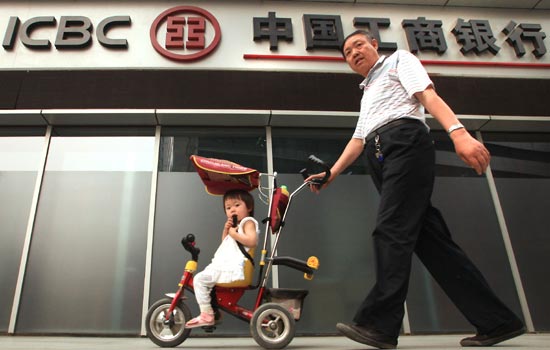
|
 |
|
A branch of the Industrial and Commercial Bank of China Ltd in Beijing. China's corporate debt-to-GDP ratio stood at 107 percent in 2011, the highest among all countries, raising concern about their financial stability. [Photo/China Daily] |
Experts say new stimulus policies could add to firms' financial burden
China's corporate debt ratios have reached "dangerous" levels, according to leading economists.
Li Yang, vice-president of the Chinese Academy of Social Sciences, a top government think tank, has warned that further stimulus policies could add to the already heavy burden of corporate debt that is weighing on the world's second-largest economy.
China's corporate debt-to-GDP ratio stood at 107 percent in 2011, the highest in the world, Li said at a forum in Zhejiang province on Friday.
A ratio that exceeds 90 percent is considered "dangerous", he said, citing a standard set by the Organization for Economic Cooperation and Development.
Li Zhenyu, rating director of China Lianhe Credit Rating Co Ltd, said the figure is likely calculated by taking the total debt Chinese banks carry from loans and other methods of borrowing, such as corporate bonds, and dividing it by the country's GDP.
Data from the China Banking Regulatory Commission show China's banking system had 55 trillion yuan ($8.63 trillion) in outstanding loans by the end of 2011. The country's GDP for the same year exceeded 47 trillion yuan.
"The figure doesn't reveal the financial positions of particular companies," said Chen Daofu, policy research chief at the Financial Research Institute of the State Council's Development Research Center.
"But large Chinese companies' debt burden is indeed increasing because of the strong momentum seen in fixed-asset investments after 2008."
Chen said the average debt-to-asset ratio of Chinese companies with more than 20 million yuan in annual revenue was about 40 percent. Some industries, such as civil aviation, are saddled with especially high debt ratios.
Chen said corporate debt is still increasing at a faster rate than revenues and he knows of no evidence suggesting debt ratios are decreasing.
"Many State-owned enterprises have seen their debt ratio lowered in recent years, while they are in the process of getting listed..., " Li said. "But, during the current economic downturn, we may see an increase in the bankruptcy rate."
The average debt ratio among listed SOEs, he said, is above 60 percent, adding that 70 percent is normally the highest acceptable rate.
"A high debt ratio is largely the result of a lack of financing channels," said Wang Yuanjing, a researcher at the National Development and Reform Commission.
Wang said equity investment and private investment could provide financing to companies help lower debt ratios.
"It's hard to say whether corporate debt ratios are under control," Wang was quoted by China National Radio as saying.
"But once these troubles break out in one company, that may cause a chain reaction and lead to a debt crisis."
Fan Junlin, a senior analyst at the Agricultural Bank of China, expressed more optimism.
"Some said China would follow Japan on the path toward two decades of stagnation after debt troubles broke out, noting that the debt ratio among non-financial companies was 59.2 percent in the first quarter, which was up 7 percentage points from five years ago.
"In fact, the Chinese economy was running on one of the highest leverage ratios in the world in early 2000... That was a result of high deposit ratios and underdeveloped financing markets."
Fan said the Chinese government has the financial wherewithal to pay off the debts of companies in the country.
"Meanwhile, another important contributor to Japan's recession, a sharp decline in property prices, will not happen in China at this moment either," he said.
weitian@chinadaily.com.cn